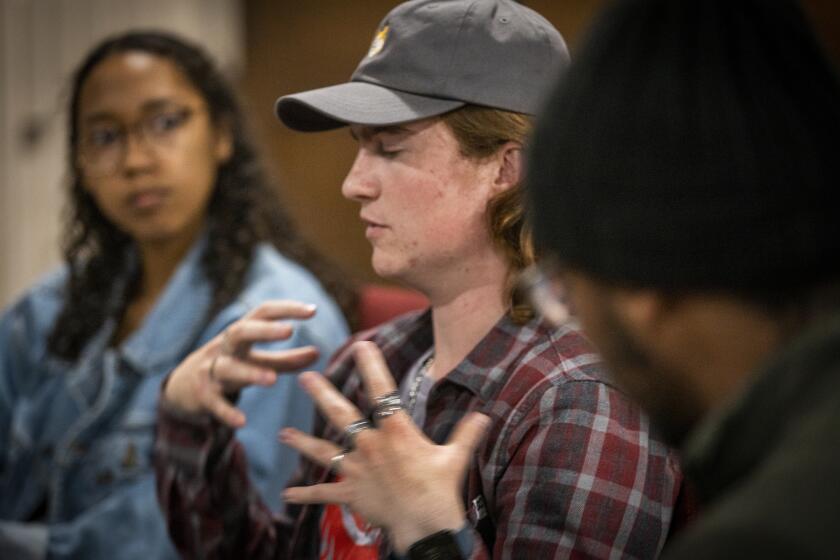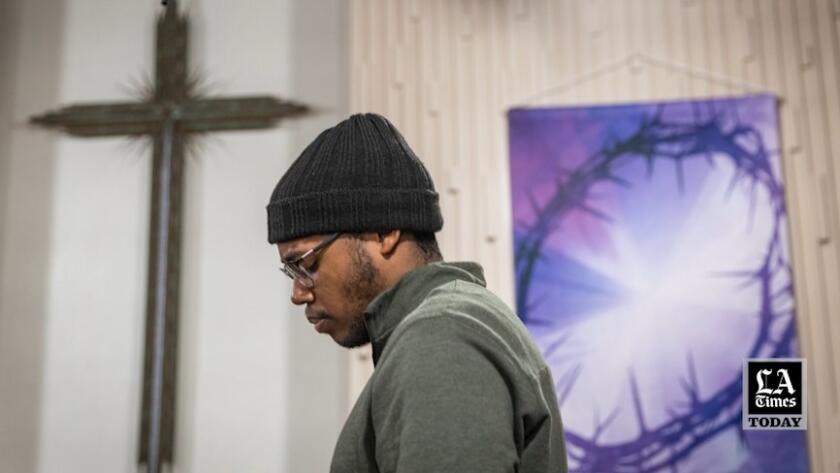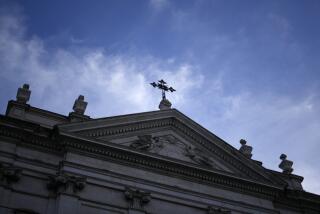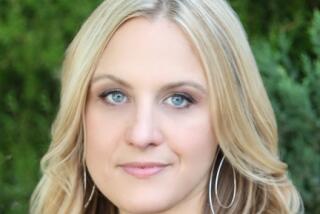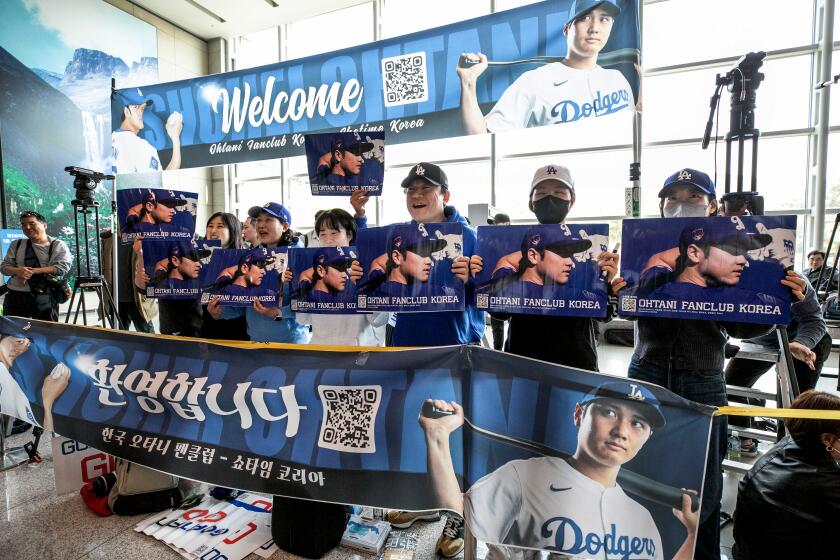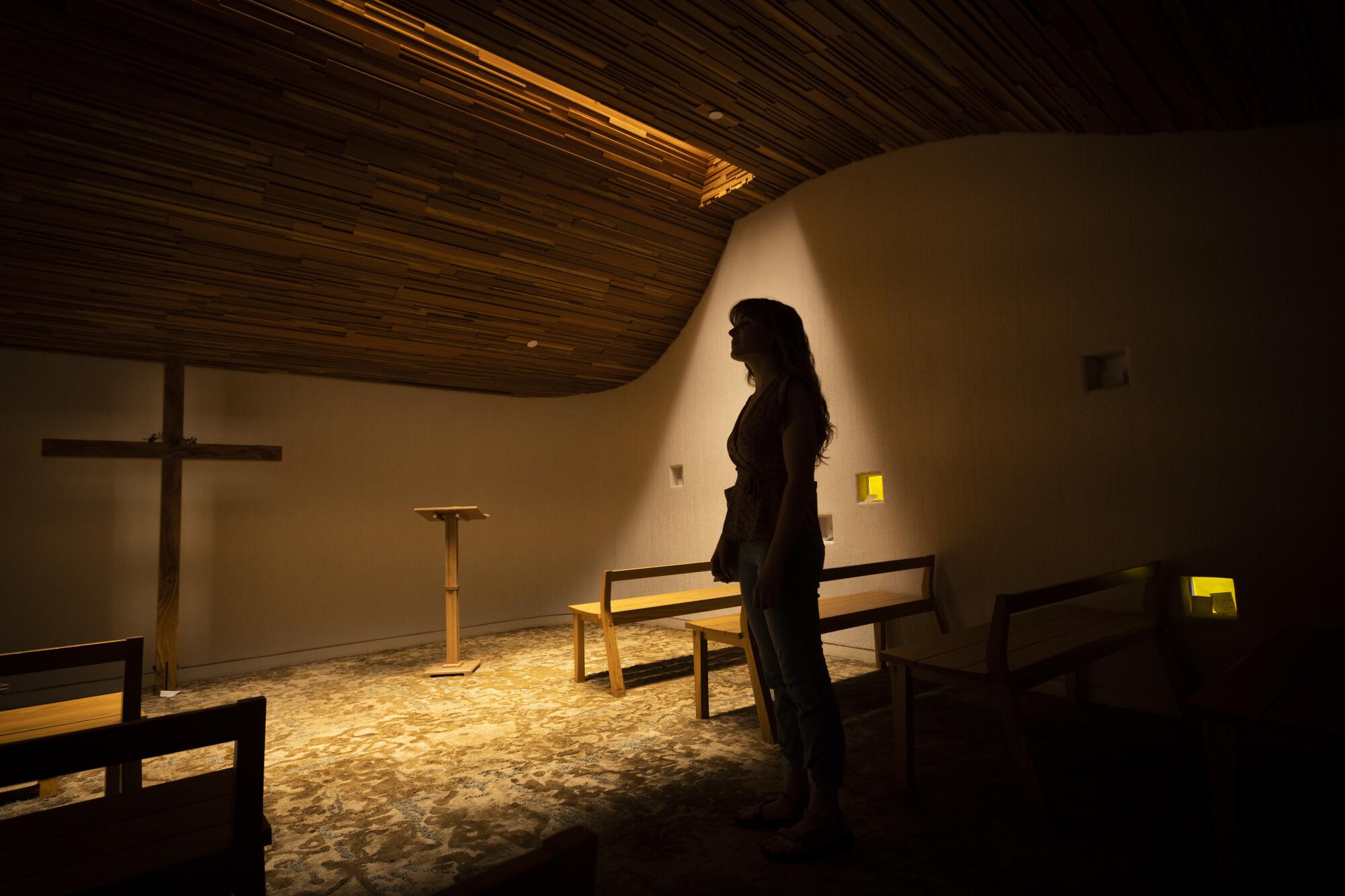
On a breezy Sunday afternoon, Biola University is a postcard of serenity. A soft light filters through a small prayer chapel where a plain wooden cross stands in front. At its base someone has left a message on a scrap of paper.
For the record:
4:41 p.m. June 10, 2022Correction: An earlier version of this story said students at Biola University sign Articles of Faith. Actually, prospective students sign a statement of faith when applying to Biola. Faculty and staff sign the university’s Articles of Faith.
Jesus, you are my guide, the joy of my heart, the author of my hope, the object of my love.
Ascetic and minimal, the room invites conversations with God. Wall niches contain similar handwritten notes.
I pray that you draw me back to you. Teach me what the weight of the cross means fully.
Biola is a private Christian university in La Mirada, whose mission is to equip its students “in mind and character to impact the world for the Lord Jesus Christ.” They know the work will be difficult. So much around them is thought to be sinful.
Jesus … I’m afraid. Your people have hurt me. My brothers and sisters in the church, betraying Black brothers & sisters with racism and hate on their lips. And Biola is no better.
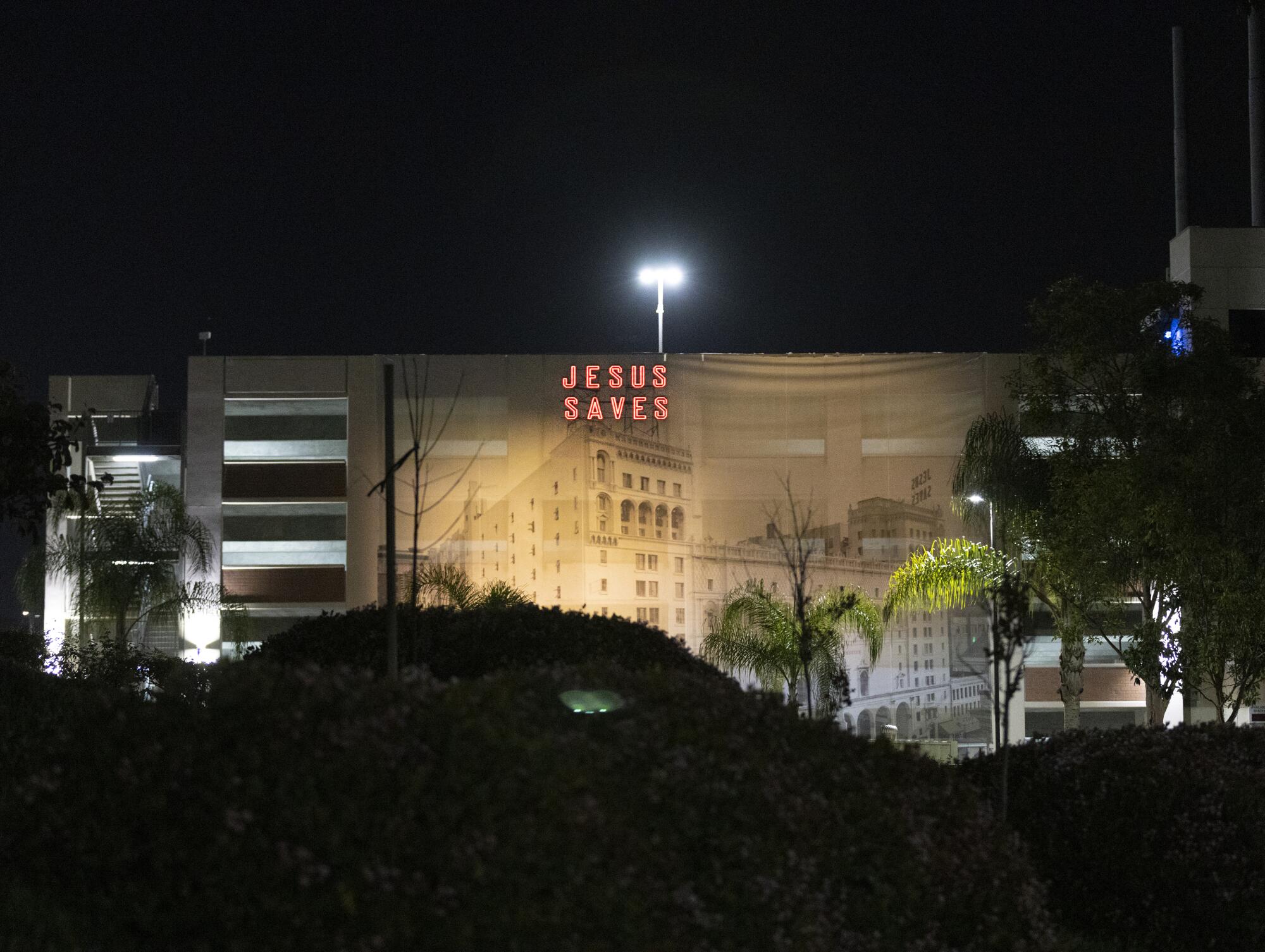
Biola has attempted to shelter its students and itself from the social and civil disturbances of recent years, but its efforts have been marginally successful. Like evangelical institutions across the country, the university is facing growing disillusionment among young Christians who believe their faith should be more progressive and socially minded.
They resent how politics has shadowed their relationship with God and believe that Christ’s lessons of humility, tolerance and love have been forgotten amid the Christian community’s embrace of the Big Lie, former President Trump and culture-war dog whistles such as LGBTQ restrictions and anti-mask and vaccination declarations.
“Evangelicals are losing their young in epidemic numbers,” said David Gushee, a nationally known pastor, ethicist and author of “After Evangelicalism: A Path to a New Christianity.” “Smart, young minds rarely color within the lines, and if they can’t ask questions and get decent answers, they will bail.”
One of Southern California’s oldest religious colleges, Biola has seen its enrollment drop, has trimmed next year’s budget and is trying to stay relevant for students while not alienating faculty and alumni.
The tension, said Richard Flory, executive director of the USC Center for Religion and Civic Culture, “helps us read what the future of evangelicalism in America might look like.”
::
More than 100 years ago, Charles Darwin forced Christians to an uncomfortable reckoning over the Bible. Either creation took six days, God flooded the world, Jesus performed miracles and the prophecies are true, or none of that ever happened — or ever will happen.
When Texas preacher Thomas Horton took the stage before 4,200 congregants in downtown Los Angeles on Easter 1915, he made clear that the Bible Institute of Los Angeles, founded seven years earlier, stood for Scripture without error or misstatement.
“We believe in the old Bible and the whole Bible and have no confidence in anyone who seeks to unsettle this belief,” he said.
Horton’s charisma, together with the money and zeal of Lyman Stewart, co-founder of Union Oil Co., helped spread fundamentalism around the world.
Their success led to the construction of an Italian Renaissance high-rise with twin 13-story dormitories for fledging theologians. Its two rooftop, neon-red JESUS SAVES signs were landmarks in the city’s skyline for decades.
But as fundamentalism spread, it was challenged. In 1925 during the Scopes monkey trial, when a Tennessee jury convicted a high school teacher of introducing evolution to his classroom, its anti-science stance was ridiculed.
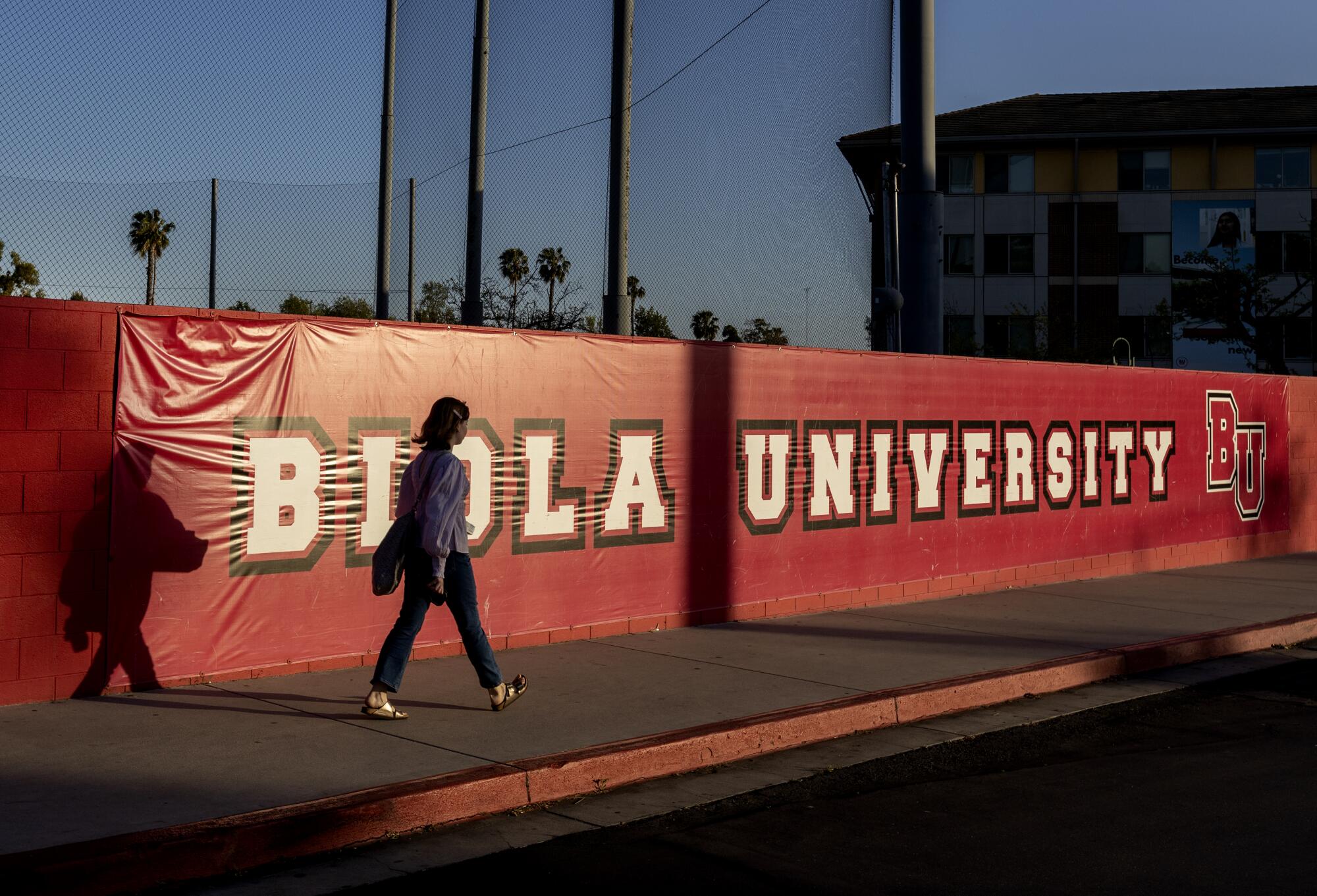
By the 1940s, Christians began turning toward evangelicalism, a less dogmatic version of the faith, and in that spirit, the Bible Institute of Los Angeles opened Biola College (later Biola University) in 1959. Evangelist Billy Graham helped with the $3-million fundraising drive.
Today students can take classes in criminology, physics, accounting, gender studies and cinema. They sign a statement of faith during the application process, and each year faculty sign Articles of Faith pledging allegiance to the truth of Scripture as it articulates “God’s vision for humanity” and prescribes a course for living in this broken world.
University President Barry Corey quotes Isaiah — to “rebuild the ancient ruins and … raise up the age-old foundations” — in arguing that Biola graduates are ready to make the necessary repairs.
“Our students — whether they are screenwriters or accountants, policy wonks or research nerds — are Gospel witnesses,” Corey said. “We want their vocations and lives to be a reflection of their Christian faith and a longing for others to know the redeeming love of Jesus.”
But some students and faculty wonder if that is enough.
::
It grieves me deeply when students don’t feel like they are welcome here.
— Biola University President Barry Corey
To argue that the Bible is without error means more than accepting its origin stories. It means accepting that the problems of the world derive from Adam’s sin and can be solved only by Christ. For some that means the Second Coming.
As dean of faculty for the theology school, Scott Rae, said last year about climate change: “Our best hope for the planet is that God’s coming back to reclaim it and to set things right and to heal what had been previously broken.”
Rae qualifies that statement (“I’m not suggesting we passively wait,” he said; “we have responsibility now”), but the role of Christ’s return has divided the evangelical community especially as it wrestles over its response to oppression and injustice in American society.
For some Christians, the path ahead is simple: Pray, proselytize and prepare your hearts. For others, fixing and reforming the world can’t wait.
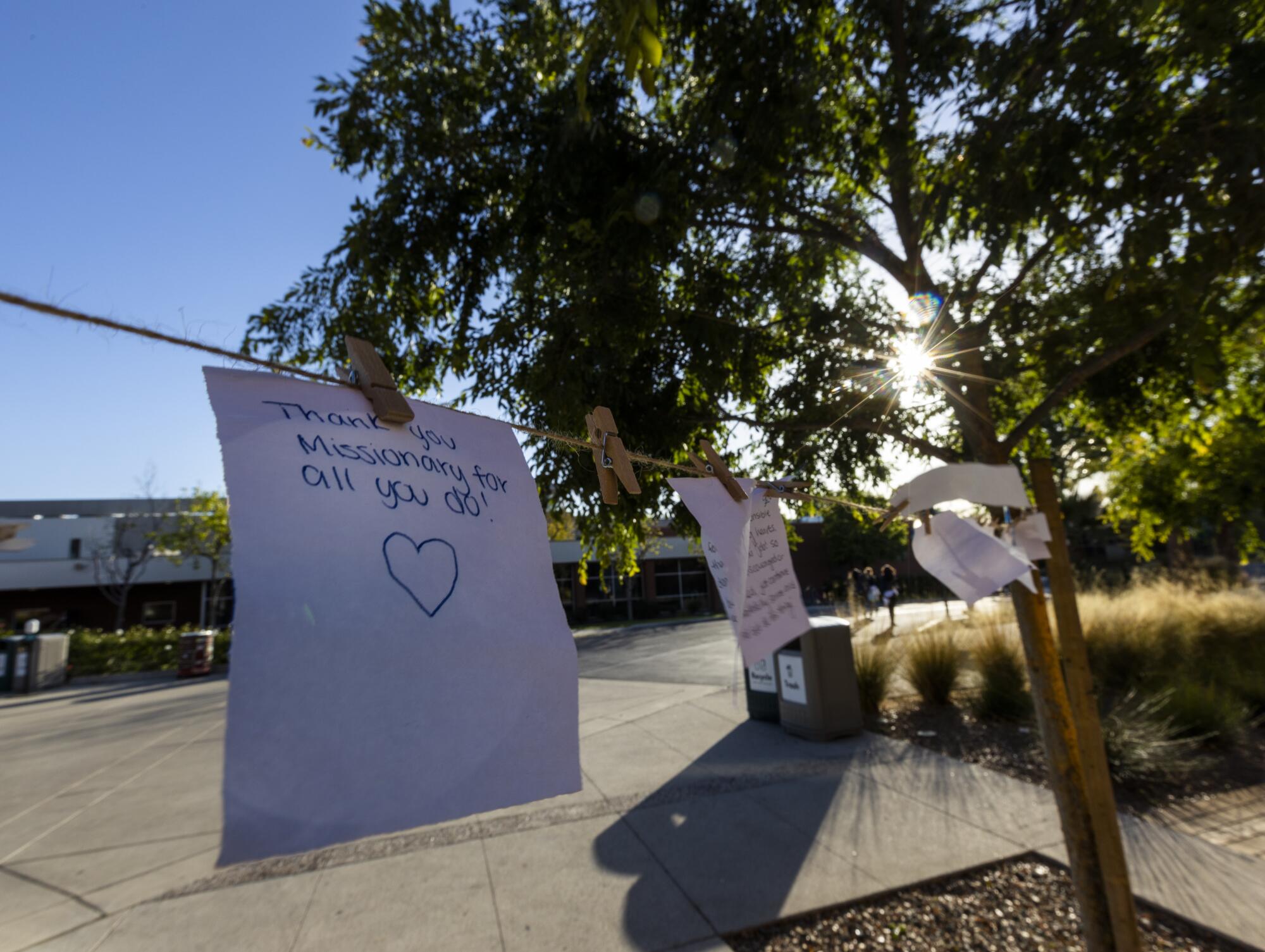
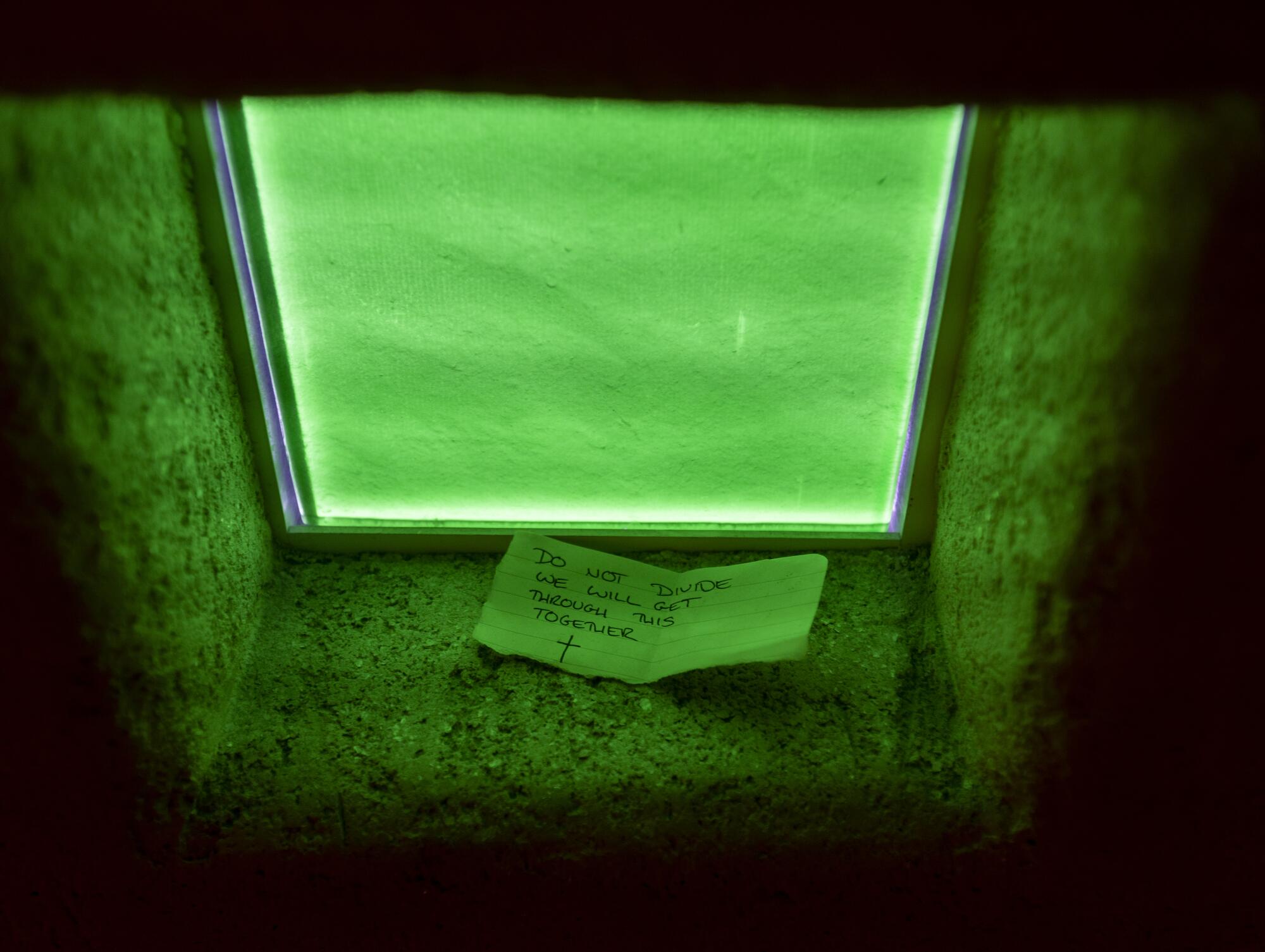
“The party line,” said one Biola professor who agreed to speak on condition of anonymity out of concern of reprisal, “is that Jesus died for your sins and to have a personal relationship with Jesus is to have eternal life. Anything else is a distraction. But we think the Gospel is also about bringing healing, restoration, justice and love to a broken world.”
The debate has taken on red and blue hues.
“In some parts of the university, there is a flowering of a more progressive, justice-oriented Christianity,” said a colleague who also asked not to be identified. “In other parts, there is pushback, a fear of a liberal Christianity that strays from Biola’s conservative roots.”
Dissent is hard to find at a university known for its culture of niceness. Yet fractures are conspicuous.
Not long after the Jan. 6, 2021, insurrection at the U.S. Capitol, the opinion editor for Biola’s student-run news site called on millennials and Gen Z to help guide Christians away from their support of the Trump presidency.
That editor, Evana Upshaw, cited Scripture to argue that, just as Moses encouraged the Israelites entering the promised land not to repeat the sins of earlier generations, young Christians need to chart a new course toward “hope and healing.”
In praise of doubt: A meeting with young evangelicals leads a reporter to unexpected questions about faith and doubt.
“Our faith, now synonymous with unwavering support for Donald Trump, is causing many to question how Christians could sell out women, immigrants, Black people, Indigenous people, people of color, the LGBTQ+ community and the poor for the sake of political power,” she wrote, concluding that “Gen Z sees the hypocrisy of Christians today. ... It’s time to pass the torch.”
Reaction was quick. Readers, commenting online, branded the piece as “propaganda,” “racist and trash,” “riddled with unfounded assumption and presumption.”
When the faculty advisor asked Upshaw, who identifies as Black/biracial, to start publishing more conservative opinions, she felt sidelined.
“I didn’t want to fight it. I felt like I was the only one giving Black issues a voice, and I was exhausted,” said Upshaw, who eventually transferred to another university.
Race, as much as politics, cuts through campus life at Biola. In 2020, during Black History Month, posters of African American leaders were defaced with a racial slur, and the university held a “lament session” for students to talk about discrimination on campus.
Corey acknowledges that “polarization and the toxic nature of the culture” have found their way to Biola.
“It grieves me deeply when students don’t feel like they are welcome here,” he said. “We’re in the business of helping students think deeply and express themselves in a reasonable, civil and humble manner, but this is taking more work than it did 15 years ago.”
With a mixed student body (43% white, 20% Latino, 15% Asian and 3% Black, with the rest identifying as other races and ethnicities), some argue that if Biola wanted to create a more inclusive culture, it would remove the 30-foot-tall Jesus mural on the side of the art building.
Completed in 1990 by L.A.-based artist Kent Twitchell, the bearded figure in a red robe overlooking the student union has long been controversial. Eyes peering skyward, he holds a leather-bound Bible.
The image is “not only historically inaccurate, but it enables and reinforces dangerous racist ideas of white power, white supremacy and white saviorism,” alumna Brianna Eng wrote in a letter to the university last year. Since graduating in 2018, Eng has lobbied for its removal.
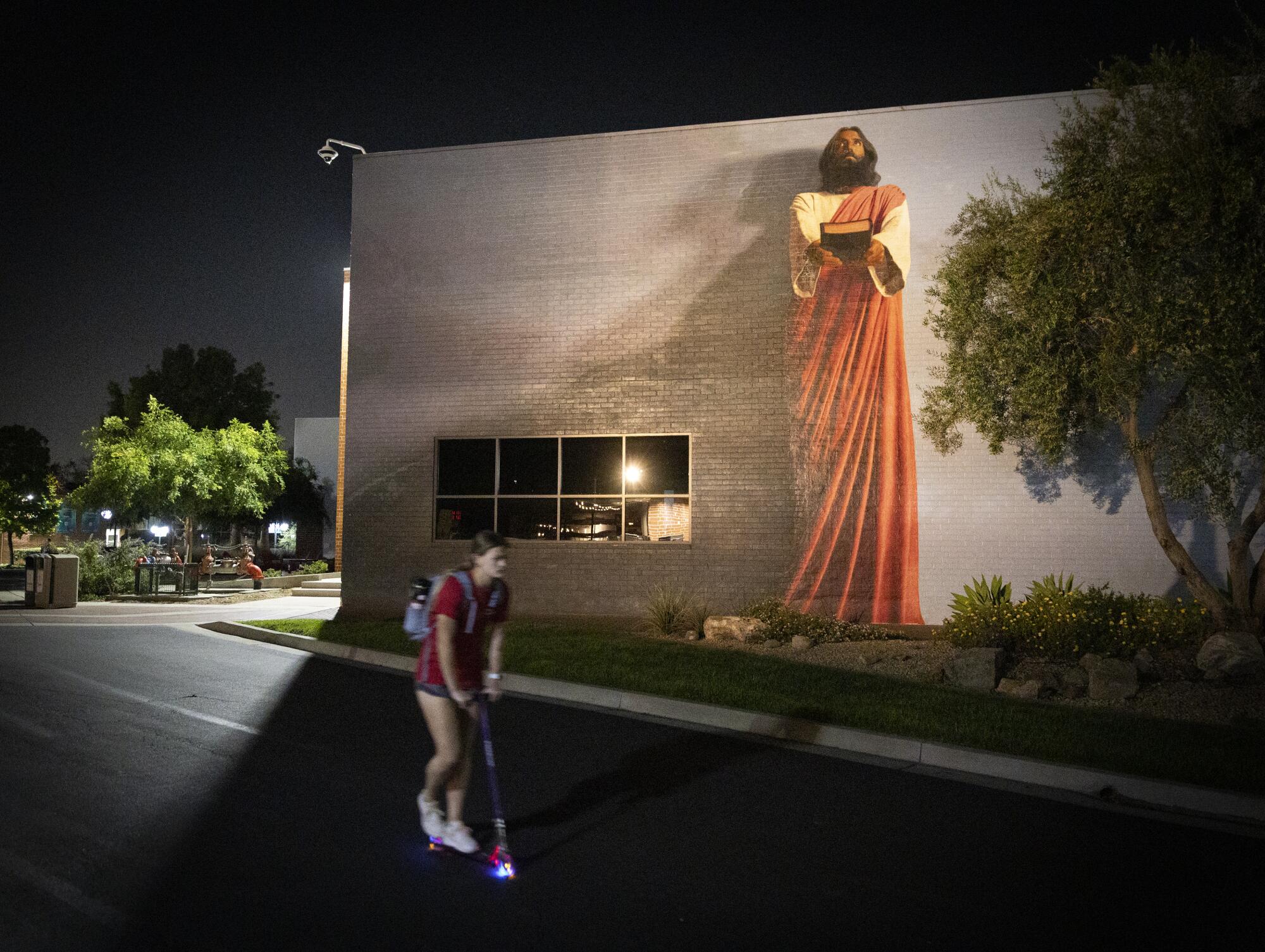
Corey is accustomed to defending the mural, arguing that it is a “source of important conversations on our campus about where we are and how to move forward.”
But Megumi Nakazawa wishes the conversations were more robust. Nakazawa, 20, who will be a senior this fall, grew up overseas and was not prepared for the contradiction she found in American life between Christian values and their application.
She cited the shootings of Asian women by a white Christian man last year in Georgia and the difficulty some people had acknowledging race as a factor in the killings.
“That was when I started to think of Christianity as causing more harm than good,” she said, and the argument from the pulpit — that the most Christians can do to improve the world is make sure their hearts are “in the right place” — sounded empty.
“We talk about theological principles of justice,” Nakazawa said, “but it is not applied to what’s happening outside of campus.”
::
When former Biola professor Lisa Swain considers the division on campus, she is reminded of the schism that emerged last year within the country’s largest evangelical denomination, the Southern Baptist Convention.
The debate focused in part on the question of racial diversity after Christian symbols and Scripture were appropriated by white nationalists.
“It begs the question of what it means to be evangelical,” Swain said, and who gets to decide.
A larger conversation, Swain said, is taking place within the Christian community over the role of authority. By claiming to know God’s intentions, institutions such as Biola signal a greater interest in “protecting power rather than grace.”
To relax its power, Biola would have to acknowledge different interpretations of Scripture, she said, and give students an opportunity to apply faith to their lives as they see fit.
Ethicist Gushee wonders if Biola can afford this stance. Christian universities, he said, are “being watched by heavy hitters in the evangelical world who will quickly call out any institution that they believe is straying.”
Straying has consequences at tuition-dependent institutions such as Biola, where undergraduate enrollment has fallen 18% from 2014 to 2021 and $5 million has been cut from next year’s budget. These declines are mostly related to the pandemic but give benefactors and donors additional leverage over the university’s future.
Corey, the university president, has made it clear that Biola will not veer from its original mission.
“For Biola, faithfulness into our strongest years to come will be possible if, and only if, we do not forsake what our founders gave us,” he wrote last September, signaling commitment to the university’s fundamentalist roots.
Some wonder if this stance might help explain the departure over the last two years of 46 faculty members, especially women and those of color.
Rae, the theology school dean, defends Corey’s commitment to Biola’s original mission and expresses no interest in Biola becoming the equivalent of a Cal State University school, but “with a veneer of Christianity.”
“What we have seen,” Rae said, “is that schools who have doubled down on their original identity and committed to biblical faithfulness are the ones whose enrollments are actually growing.”
The recent appointment of Matthew Hall as provost seems to confirm this intention.
Hall, formerly with the Southern Baptist Theological Seminary, questions critical race theory, believes church is “far more consequential to eternity than any earthly political development” and argues that adherence to biblical truth will reward not just students and faculty but also donors.
Gushee is not surprised the university would follow this course.
“Conservative Christian universities play a kind of trick here,” he said. “They say they are returning to their founding principles, but their responses are remarkably similar to whatever conservative Republican politics looks like at a given moment.”
“Right now,” he added, “that is culture wars-oriented, white reactionary politics, and if this reactionary politics shuts down urgent educational discussions, it is the students who lose.”
::
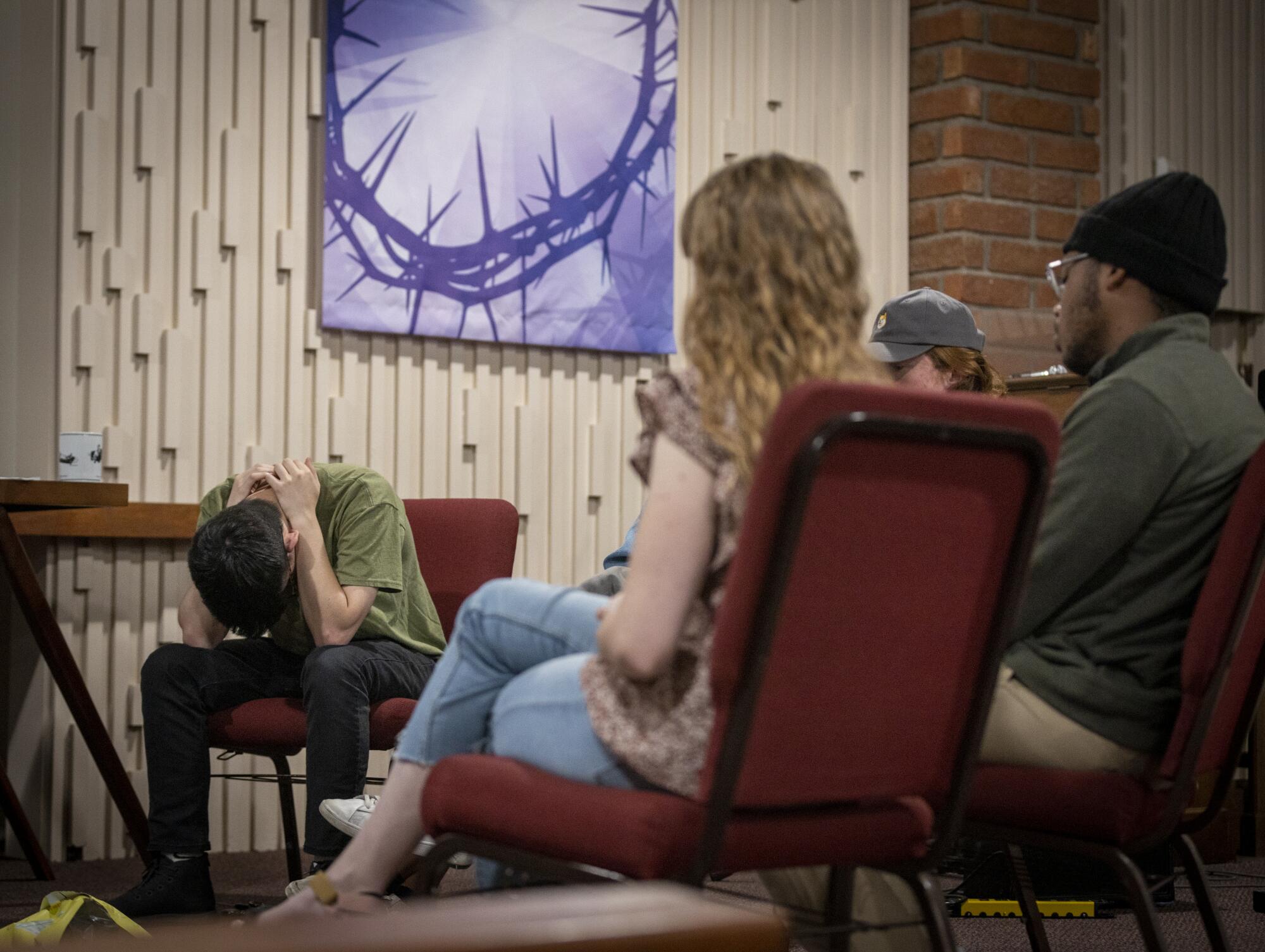
Frustrated by the university’s doctrinal rigidity, some current and former Biola students are having their own theological discussions. They gather two miles off campus at a United Methodist Church every other Sunday with the belief that faith is more than an either/or proposition.
They call themselves the St. Thomas Collective for the apostle who questioned the resurrection until the crucified Jesus stood before him. Christian in spirit, nondenominational in practice, they want to provide what they haven’t found at Biola: a nonjudgmental space for open inquiry.
The group started in 2016, initially meeting in a garage “to voice their questions and doubts and wild ideas.” They currently have up to 50 members at large.
“This is the community that Biola should be trying to hold on to,” USC’s Flory said. “Most young people don’t care about religion, but if you have young people trying to grapple with their faith — so they can make sense of it, given the world they experience — you should listen to them.”
On a recent Sunday, nine members sat in a semicircle in front of the altar sipping tea and munching Oreos.
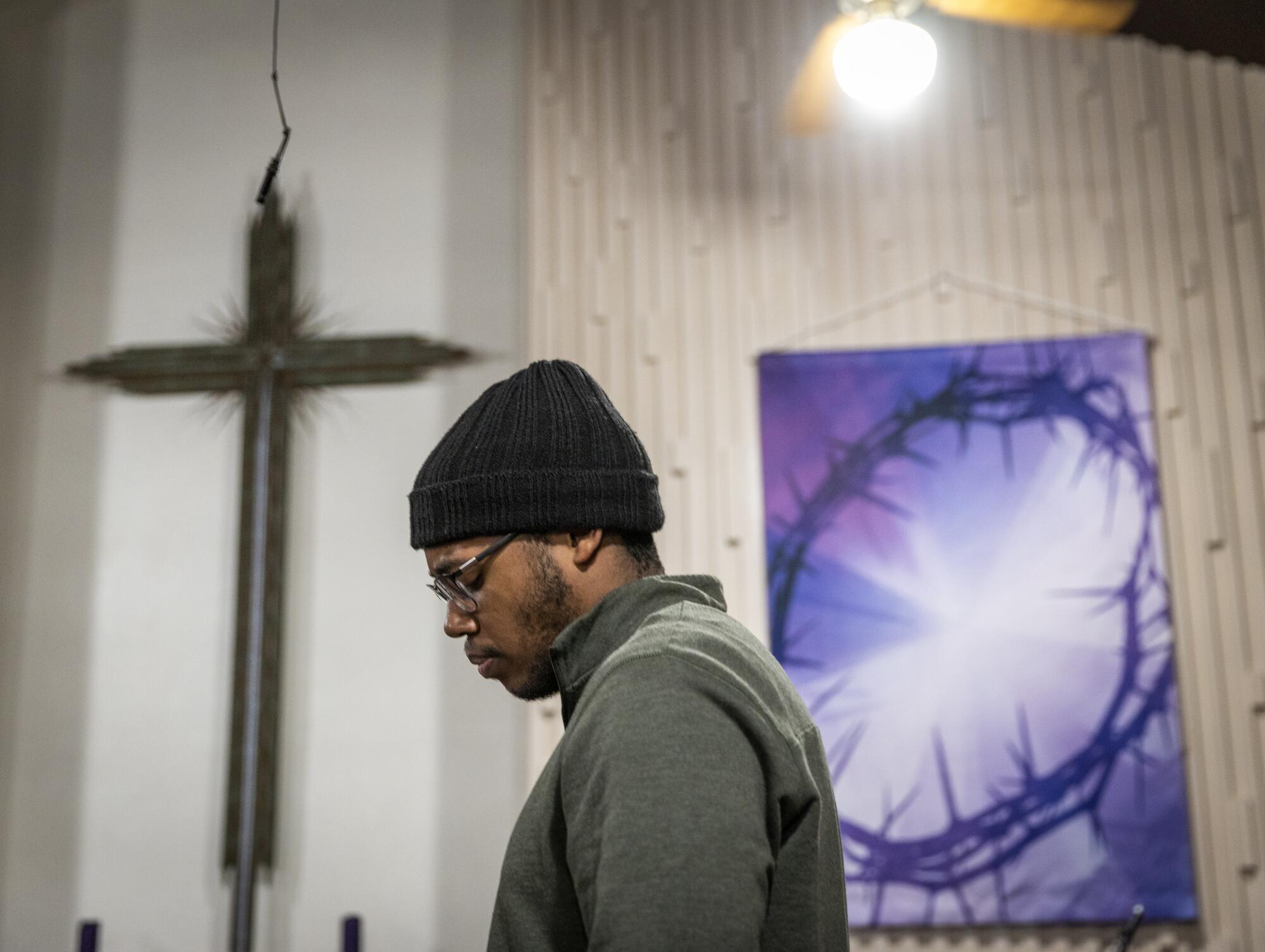
“From an early age, my family told me I was going to be a pastor,” said Jaloni Wilson Ford, 22, a senior majoring in Christian ministries. “All that I did was to lead me to God, but over the last five years, I’ve done a 180- or at least a 90-degree turn,” questioning traditional understandings of God.
Most grew up in their parents’ church. They said prayers before each meal, read the Bible at night and understood that they were being kept safe from the world. Now they were stepping out on their own.
“When I got to Biola, I saw a lack of consistency between the biblical values of loving your neighbor and the way many students treat and talk about others on campus,” said Brandon Hall, 22, a senior majoring in human biology.
They hold no ill will toward Biola and are not ready to leave the university. But Samantha Smith, who graduated in 2019 with a degree in psychology, remembers feeling alone and frustrated as a student.
Professors had their “cookie-cutter answers,” she said, and friends told her how wonderful God is. “Everybody was on the Jesus train,” where the choices were either “hop on or burn.”
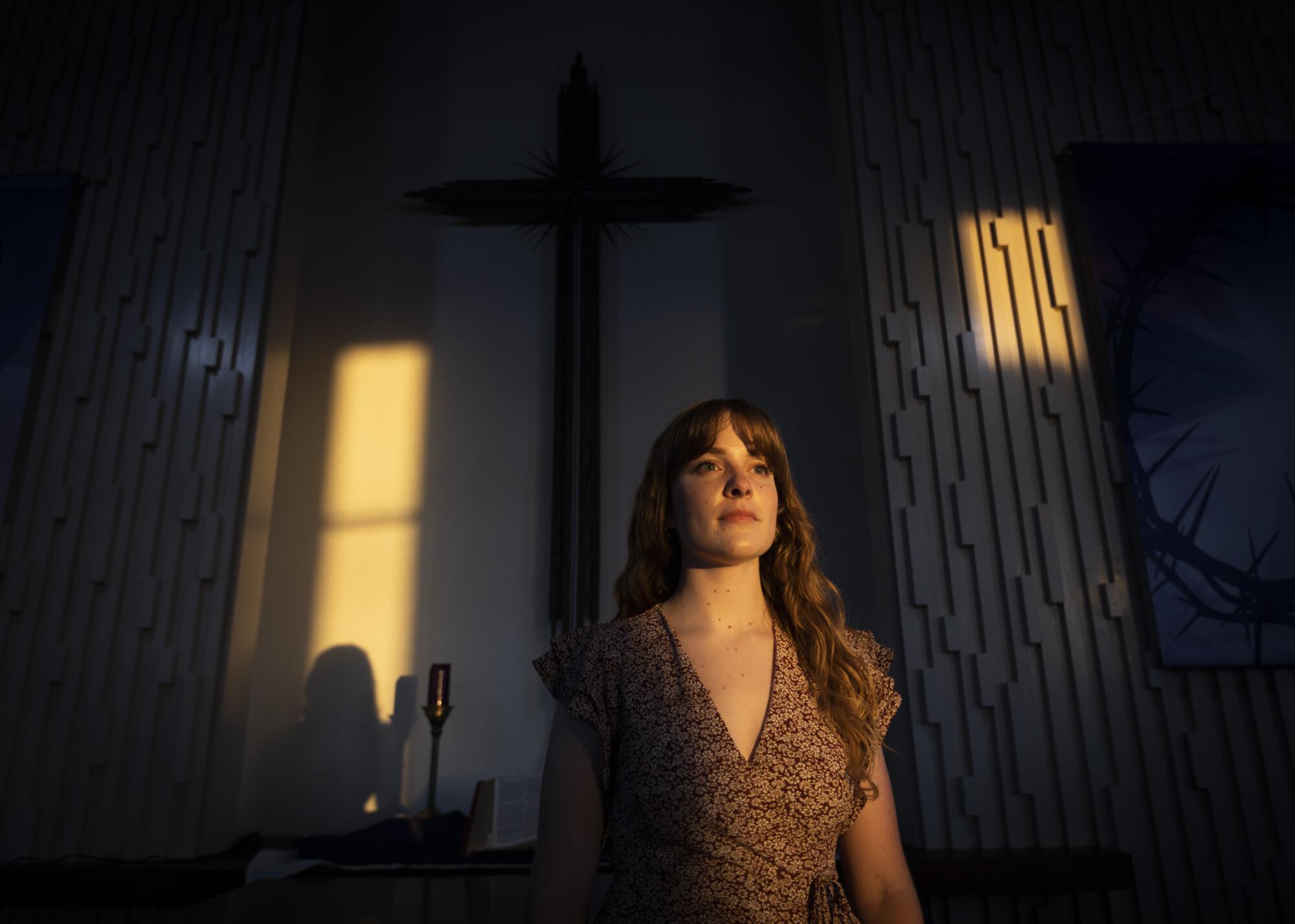
Sophie Byerly, 21, a junior majoring in music therapy, started at Biola three years ago, and each day felt like a test among those who could profess to be “the most on fire for God.”
Her practice was more quiet. As a teenager, she aspired to be the “radically good person” that Jesus wanted his disciples to be. Now she is trying to decide whether or not to believe in Christianity.
After listening to a podcast about factional discord in Ireland and the search for common ground, the collective discussed developing friendships outside their Christian community.
A little past 9, the Oreos were nearly gone. After prayer and signs of peace, Smith cued a song on her computer. Piano chords drifted through the sanctuary, and the Brilliance began to sing:
Give me doubt, so I can lay all my weapons on the ground.
When the armor of God is too heavy for peace,
give me doubt, give me doubt.
Watch L.A. Times Today at 7 p.m. on Spectrum News 1 on Channel 1 or live stream on the Spectrum News App. Palos Verdes Peninsula and Orange County viewers can watch on Cox Systems on channel 99.
More to Read
Start your day right
Sign up for Essential California for news, features and recommendations from the L.A. Times and beyond in your inbox six days a week.
You may occasionally receive promotional content from the Los Angeles Times.
